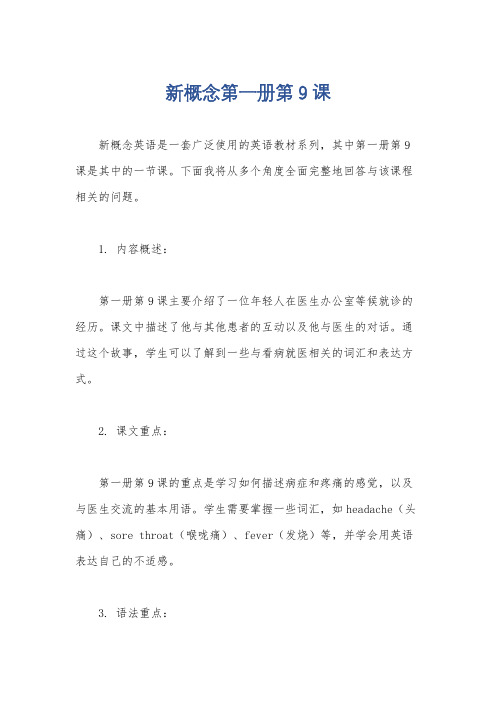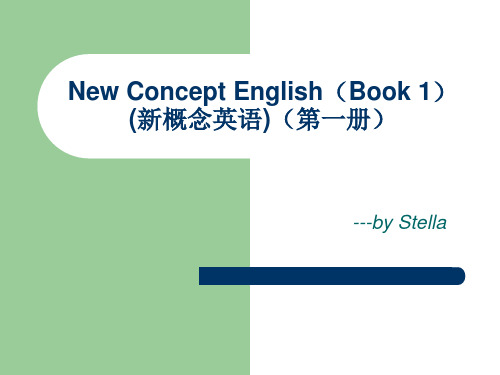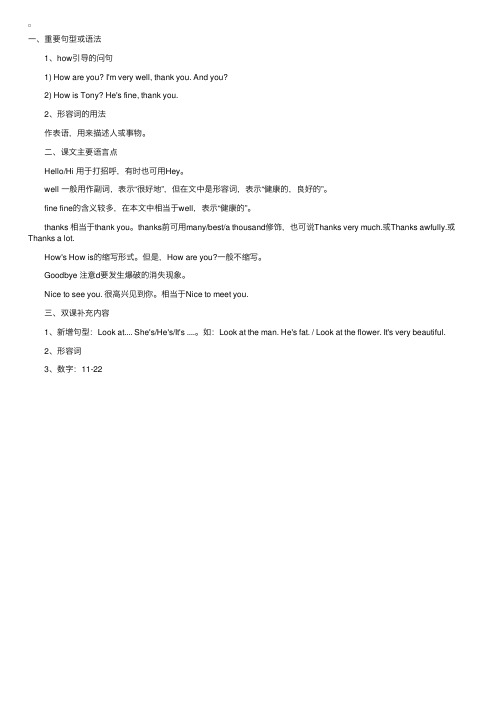裕兴版新概念英语笔记第一册第9课
- 格式:doc
- 大小:34.50 KB
- 文档页数:4

新概念第一册第9课新概念英语是一套广泛使用的英语教材系列,其中第一册第9课是其中的一节课。
下面我将从多个角度全面完整地回答与该课程相关的问题。
1. 内容概述:第一册第9课主要介绍了一位年轻人在医生办公室等候就诊的经历。
课文中描述了他与其他患者的互动以及他与医生的对话。
通过这个故事,学生可以了解到一些与看病就医相关的词汇和表达方式。
2. 课文重点:第一册第9课的重点是学习如何描述病症和疼痛的感觉,以及与医生交流的基本用语。
学生需要掌握一些词汇,如headache(头痛)、sore throat(喉咙痛)、fever(发烧)等,并学会用英语表达自己的不适感。
3. 语法重点:在第一册第9课中,语法重点主要集中在一般现在时和一般过去时的运用。
学生需要学会正确地使用这两个时态来描述自己的病情以及过去的经历。
4. 学习方法:为了更好地学习第一册第9课,学生可以采取以下学习方法:首先,认真阅读课文,理解故事情节和主要词汇。
其次,重点记忆和理解课文中的语法点和表达方式。
接着,进行口语练习,模拟与医生的对话,加强语言运用能力。
此外,可以找一些相关的练习题或者参考答案进行巩固和复习。
5. 学习目标:通过学习第一册第9课,学生应该能够:理解并运用与看病就医相关的词汇和表达方式。
描述自己的病情和疼痛感。
运用一般现在时和一般过去时来描述自己的病情和过去的经历。
提高听力和口语能力,能够与医生进行简单的交流。
总结起来,第一册第9课是新概念英语系列教材中的一节课,主要介绍了与看病就医相关的内容。
学生需要通过学习掌握相关的词汇、语法和表达方式,以提高自己的英语能力。
希望以上回答能够满足你的要求,如果还有其他问题,请随时提问。



第一部分Lesson 9~~Lesson 10 单词笔记测试答案单词测试词组句型测试1. —你好吗? (熟人见面询问身体状况)How are you?—回答(2种):I am fine./I am well.下面的回答是比较地道的回答方式,但不符合语法规则:(要求读熟)积极的回答方式(好):Pretty good./I am doing good./I’m great./I am wonderful.相当好/我很好/我好极了/好极了。
不够积极或不够肯定的回答(不太好):Just so so./Well, a little bit tired./All right./Not bad.马马虎虎/哦,有一点点的累/还好吧/不是很糟糕2. 对How are you?的完整回答。
I am fine. Thank you./Thanks. And you?=I am fine. Thank you. /Thanks. And how are you?3. She’s very well, too.too “也”,用在肯定句或疑问句的句尾。
also “也”,用在肯定句或疑问句的句中。
4. —Goodbye. (回答)—Goodbye.5. —Nice to see you. (回答)—Nice to see you, too.6. 在墙上(表面上)on the wall在墙上(镶嵌在墙里)in the wall7. man n. 男人(复数)— menwoman n. 女人(复数)—women8. 写出下列词的缩写形式:he is=he’s she is =she’s it is=it’s第三部分:语法测试(本周复习,无)。

新概念英语课堂笔记第一册Lesson 9-10Word Studywell【用法】adj. 健康的;良好的adv. 好地;满意地【词组】be well 身体好do well 做的好【例句】I am very well. 我身体很好。
All is well with the family. 家中一切都好。
He did well in the exam. 他考试成绩很好。
fine【用法】adj. 健康的;极好的;优秀的;晴朗的【例句】—How are you? 你好吗?—I’m fine. Thank you. 很好,谢谢。
a fine view 美好的景色a fine teacher 优秀的教师a fine day 晴朗的天气反义词fat <反> thin 胖的—瘦的thick <反> thin 厚的—薄的tall <反> short 高的—矮的long <反> short 长的—短的dirty <反> clean 脏的—干净的hot <反> cold 热的—冷的old <反> young 老的—年轻的busy <反> free 忙的—闲的lazy <反> hard-working 懒的—努力的woman【用法】n. 女人【同义】female n./adj. 女人,女性的,雌性的【扩展】man n. 男人male n./adj. 男人,男性的,雄性的Numbers21—twenty-one 22—twenty-twoText ExplanationHow are you today?【译文】你今天好吗?【用法】这是一句寒暄用语,用于熟人之间的问候。
如问及对方的先生或太太的情况,可以说How is Tony? 或How is Emma? 等。
见下文。
I’m very well, thank you. And you?【译文】很好,谢谢你。

⼀、重要句型或语法
1、how引导的问句
1) How are you? I'm very well, thank you. And you?
2) How is Tony? He's fine, thank you.
2、形容词的⽤法
作表语,⽤来描述⼈或事物。
⼆、课⽂主要语⾔点
Hello/Hi ⽤于打招呼,有时也可⽤Hey。
well ⼀般⽤作副词,表⽰“很好地”,但在⽂中是形容词,表⽰“健康的,良好的”。
fine fine的含义较多,在本⽂中相当于well,表⽰“健康的”。
thanks 相当于thank you。
thanks前可⽤many/best/a thousand修饰,也可说Thanks very much.或Thanks awfully.或Thanks a lot.
How's How is的缩写形式。
但是,How are you?⼀般不缩写。
Goodbye 注意d要发⽣爆破的消失现象。
Nice to see you. 很⾼兴见到你。
相当于Nice to meet you.
三、双课补充内容
1、新增句型:Look at.... She's/He's/It's ....。
如:Look at the man. He's fat. / Look at the flower. It's very beautiful.
2、形容词
3、数字:11-22。
新概念英语笔记(第一册)Lesson 9-10Content and Aim 内容和目标♦How引导的特殊疑问句♦单数代词加形容词的用法Key Words and Expressions 关键词和词组today 今天well 身体好fine 美好的thanks 谢谢see 见Language Points 语言点♦How are you today?1.英语中,朋友和相识的人之间见面时询问对方身体情况寒暄的话。
一般回答用Fine, thank you!/I’m fine, thank you!2.根据询问的人不同,使用的Be动词有所变化。
课文中用同样的句型,问候了对方的家人。
例如:How is he/Tony? –He’s fine, thanks./He’s very well, thanks.3.这个句子是how引导的一个特殊疑问句,How一般表示“怎样,怎么样”。
同样还有其他的问候方式,也用到how.例如:How are you doing today? (现在更流行用这个句子)注意:前面学习的How do you do这个句型是正式见面中的问候,而不是这里的“怎样”的意思,因此不能用语询问身体情况。
一定要注意区别!♦And you?=And how are you? 这是一种简略说法。
一般在上下文清楚的时候使用。
♦fine, well这两个形容词语,都是可以用于表示身体情况的。
什么是形容词?1.形容词可以用来表示某人,某物的特点,表示“是什么样、看上去怎么样”。
例如I’m fine/ I’m very well.2.形容词还可以用于直接修饰一个名词,直接放在名词前面,我们称之为“定语”He is a fat man.♦--- Goodbye, Helen. --- Nice to see you.1.表示“再见”的最常见说法就是Goodbye, 也可以只用”Bye”或”See you”2.Nice to see you=Nice to meet you1)首次见面时候的问候,同前面学习的“Nice to meet you”意思相同。
新概念英语笔记第一册Lesson 9 How are you today?[词汇](9)hello int. 喂(表示问候)hi int. 喂,嗨how adv. 怎样today adv. 今天well adj. 身体好fine adj. 美好的thanks int. 谢谢goodbye int. 再见see v. 见✓how adv. 怎样How about that? 怎么会这样?那一个怎么样?How come?=Why? 为什么?How goes it? = How is it going? 事情进展如何?✓fine adj. 美好的①健康的;舒适的②极好的,优秀的a fine view 美好的景色③优雅的,雅致的He is a man with fine manners. 他是一个举止优雅的男人。
✓see v. 见see 表示看见的结果look 表示看的动作look at sth. look out of the window look into my eyes watch 观看移动的一些东西watch TV[语法]How …?的一些社交上的用法:1、用于询问健康状况或一般生活情况:How are you? /How have you been? 你一向可好?2、How do you do ?是正式介绍中的一句套话,从不用来询问健康。
3、How经常用在询问目前状况的疑问句里:How’s life? 生活如何?How are things? 情况怎样?How’s work? 工作怎么样?形容词的意义与作用:1、形容词修饰名词所指的人、物等,说明人、物等是什么样或看上去是什么样的。
2、许多形容词可用以回答What’s…like?这样的问题,并可根据上下文给出笼统或确切的信息。
What’s Tom like?He’s very fat.3、英语中形容词作定语时一般置于名词之前。
新概念英语第一册第9课笔记一、单词。
1. How are you today?- how:疑问副词,用于询问方式、程度、健康状况等。
在这里是询问健康状况,可译为“怎么样”。
- are:be动词的第二人称单数和复数形式(you作主语时),在这里表示“是”,与how连用构成特殊疑问句,询问对方的状态。
- you:第二人称代词,主格和宾格同形,在这里作主语,意为“你;你们”。
- today:名词,意为“今天”,作时间状语。
2. well.- 作形容词时,意为“健康的;良好的”。
例如:I'm well.(我身体很好。
)- 作副词时,意为“很好地;充分地;满意地”。
例如:He can speak English well.(他英语说得很好。
)在课文中是形容词,表示健康状况良好。
3. fine.- 形容词,意为“美好的;健康的;(天气)晴朗的”。
在课文中表示健康状况良好,和well意思相近。
例如:I'm fine, thank you.(我很好,谢谢你。
)4. thanks.- 名词,复数形式,意为“感谢;谢谢”,是thank的复数形式。
通常用于对别人的问候、帮助等表示感谢。
例如:Thanks a lot.(多谢。
)也可以单独使用,如课文中的“Thanks.”二、课文重点句型。
1. How are you today?- 这是英语中常见的问候语,用于询问对方当天的身体状况或整体状态。
回答通常是“I'm fine, thank you.”或者“I'm well, thanks.”等。
2. I'm fine, thank you. And you?- 这是对“How are you?”的标准回答。
“I'm fine, thank you.”表示“我很好,谢谢你。
”“And you?”是“And how are you?”的简略形式,用于反问对方的情况。
三、语法。
1. be动词的用法。
[词汇]on prep. 在……之上shelf n. 架⼦,搁板 on the shelfLesson 24 Give me/him/her/us/them some…[词汇]desk n. 课桌table n. 桌⼦plate n. 盘⼦cupboard n. ⾷橱cigarette n. ⾹烟television n. 电视机floor n. 地板 on the floordressing table 梳妆台magazine n. 杂志bed n. 床newspaper n. 报纸stereo n. ⽴体声⾳响 [5stiEriEu]介词短语做后置定语on, inon the tablein the kitchena beautiful flowera book on the desk定语从句The girl I saw yesterdaythe magazine on the bedthe book on the stereothe box on the cupboardthe cigarette on the tablethe bottle on the dressing tablethe desk on the floorthe book on the deskThe book is on the bed.There is a book on the bed. 床上有本书。
give me a glass some ⼀些anysome 和 any 跟可数名词的复数或者是不可数名词some bookssome milk⼀般情况下,some ⽤于肯定句中,在表⽰征求对⽅意见,并且希望得到肯定的答复时也可以⽤于疑问句。
Would you like something to drink? 你想喝点什么吗?any ⽤于否定句和疑问句Give me some glasses, please.Which one?Which ones? 哪⼀些These ones?这⼀些吗?These glasses?No, not those.[these 这些]The ones on the shelf.The ones on the bed. 床上的那些。
Lesson 9 How are you today?语音—合口双元音2★合口双元音:[ai] [au] [ɔi]★双元音[ai]发音要点:由[a:]向[i]滑动[ai]—i(开音节中,即以元音字母结尾或以辅音字母e结尾的音阶)time时间fine好的five 五kite风筝like喜欢side边,旁边wife妻子eg. We should save time. 我们应该节约时间。
eg. How are you today? I’m fine. 你今天怎么样呀?我很好。
eg. five pens 五只钢笔eg. fly a kite 放风筝eg. I like my parents. 我喜欢/爱我的父母。
注意:wife发w时,千万不要用上齿碰下唇,即牙齿不接触唇。
[ai]—ighhigh高的night晚上light灯bright明亮的,聪明的fight打架tight紧的注意:1. high的反义词是low。
2. tights n.(女)紧身裤eg. good night! 晚安!eg. turn on the light 打开灯/turn off the light关灯[ai]—icry哭my我的sky天空fly v.飞/n.苍蝇July七月reply回答eg. This is my car. 我的小汽车。
eg. blue sky 蓝蓝的天空eg. The bird is flying. 这只鸟正在飞行。
eg. 回答我answer me/ reply to me.(reply后面一般加to)[ai]—ie:die v.死lie v.说谎,躺下tie领带[ai]—ye:eye 眼睛bye int.再见dye v.染色eg. beautiful eyes 美丽的眼睛eg. dye the hair brown. 把头发染成棕色Read these sentences:1. The kite is flying highly in the sky. 风筝在高空中飞着。
2. His wife died in July 1995. 他的妻子死于1995年7月。
3. Eyes never lie. 眼睛从来不说谎。
You said you love me, but your eyes never lie. 你说你喜欢/爱我,但你的眼睛不会说谎。
4. Turn on the light at night and the room becomes bright. 晚上把灯打开,房间就变得明亮了。
5. Don’t cry, I will be your side. 不要哭,我会在你的身边。
6. The time is so tight. 时间真紧。
比较:[æ] 和[ai][æ] [ai]back n.后面;adv. 向后bike自行车bat蝙蝠;球拍bite n./v.咬;刺痛cat 猫kite 风筝fat 肥的,胖的fight n./v. 打架,斗争★双元音[au],与上一个[ai]都是合口元音,即口形由大变小[au]—ouabout prep.关于around围绕found 找到(原形find)mouse老鼠(pl. mice)loudly喜欢shout喊eg. about me 关于我/ around the house 围绕这房子eg. I found a new watch. 我找到一块新表。
eg. Shout loudly/read loudly. 大声喊/读。
[au]—owdown adv.乡下crowd人群town 城镇棕色now现在how 怎么样allow允许Read these sentences:1. I found a brown mouse in the house. 我在房子里发现了一只棕色的老鼠。
2. Don’t shout loudly. Sit down. 不要大声叫坐下。
3. How can you allow him in? 你怎么可以让他进来呢?4. He is out and running around the town. 他不在,他正在镇子到处乱跑。
区别:[ɔ]和[au][ɔ] [au]not不now现在hot热how 怎么样lot许多loud大声的shop商店shout喊叫top顶部town城镇★双元音[ɔi],先发[ɔi] ,单舌位比单元音[ɔ]要略高一些,然后向后一个元音[i]滑动[ɔi]—oi:oil油,石油boil煮voice 声音choice选择noise噪音eg. cooking oil 食用油(自己加的)eg. boil an egg 煮鸡蛋eg. in a low voice 以低的声音/in a high voice高声地,大声地eg. I had no choice. 我没得选。
eg. make a noise 制造噪音[ɔi]—oy:boy男孩enjoy喜欢annoy 讨厌toy玩具eg. I like watching TV. = I enjoy watching TV. 我喜欢看电视。
Read these sentences:1. The boy is making a noise. 这个男孩弄出很多噪音。
2. The boy enjoys playing toys. 这个男孩喜欢玩玩具。
3. It’s annoying to speak in a loud voice. 大声说话真烦人。
4. The oil is boiling. 油开了。
合口双元音—review[ei] take取,拿snake蛇face[əu] go去snow joke[ai] bright cry eye[au] how now aloud[ɔi] boy enjoy voice单词讲解[词汇](9)hello int. 喂(表示问候)hi int. 喂,嗨how adv. 怎样today adv. 今天well adj. 身体好fine adj. 美好的thanks int. 谢谢goodbye int. 再见see v. 见★how 怎么样(特殊疑问词)--how many 多少(可数名词复数)eg. How many students? 有多少名学生?eg. How many girls? 有多少名女孩?eg. How many coats? 有多少见大衣/外套?--how much 多少(不可数名词,价格)eg. How much tea? 多少茶水?eg. How much water? 多少水?eg. How much is the handbag? 这个手提包多少钱?eg. How much is it? 这个多少钱?--how long 多长时间eg. How long have you been in China? 你来中国已经有多长时间了?--how often 多经常(频率)eg. How often do you watch TV? 你多长时间看一次电视?eg. How often do you take a bath? 你多长时间洗一次澡?--how far 多远(距离)eg. How far is it from here? 从这里到那里有多远?/距离这里多远--how soon 多久eg. I am leaving for Shanghai on business. 我正要出差到上海。
How soon will you come back? 那你将在什么时候回来呀?eg. How is it going? 近来怎么样?/进展怎么样?eg. How are you? 你的身体怎么样?/你好吗?(第一次见面不能问,只能问熟人)★today adv.今天--yesterday 昨天--tomorrow 明天★well1)adv. 好(修饰动词)eg. He cooks well. 他做得一手好菜。
eg. He does well in English.他英语好。
2)adj. 身体好eg. How are you, today? 你今天身体好吗?I am well. Thank you, and you? 我很好。
谢谢你。
你呢?3★fine adj. 美好的eg. How are you? I’m fine. / I’m well.★thanks int. 谢谢=thank you★goodbye = see youeg. See you tomorrow. 明天见★see v. 看见,表示结果eg. I see a bee. 我看见一只蜜蜂。
eg. I see a pen on the desk. 我看见一只钢笔在书桌上。
eg. I see a lot of money in her handbag. 我看见许多钱在她的手提包里。
--look 强调动作过程eg. Look at the blackboard. 看黑板。
eg. Look at that fat man. 看那个胖男人。
--watch v. 看,注视(所看的画面是移动的)n. 手表eg. I watch TV everyday. 我每天看电视。
eg. watch a football game 看足球比赛课文讲解◆Hello, Helen. Hi, Steven.--hello, hi 一般用于熟人之间打招呼,比较随意◆How are you today?--这是朋友和相识的人见面时关于身体情况的一种寒暄。
初次见面用How do you do?表示“你好!”。
◆I'm very well, thank you. And you?--And you?= And how are you?◆I'm fine, thanks.--thanks=thank you◆How is Tony?==How is he?◆Nice to see you.--Nice to meet you. (初次见面时打招呼用语)--Nice to see you. (相互认识的人见面时打招呼用)。